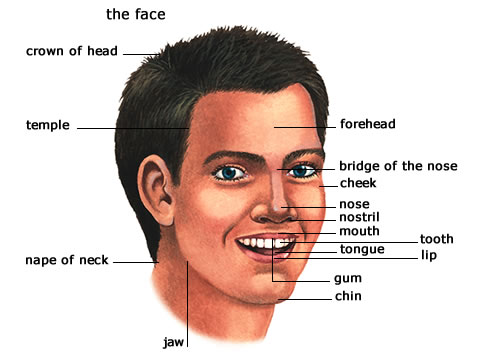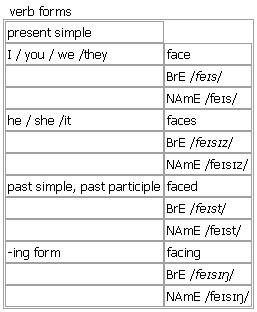 face
face

face [face faces faced facing] noun, verb BrE [feɪs] NAmE [feɪs]
noun 
FRONT OF HEAD
1. the front part of the head between the ↑forehead and the chin
•a pretty/round/freckled face
• He buried his face in his hands.
• You should have seen the look on her face when I told her!
•The expression on his face never changed.
•At that time, her face was on the covers of all the magazines. 
EXPRESSION
2. an expression that is shown on sb's face
•a sad/happy/smiling face
• Her face lit up (= showed happiness) when she spoke of the past.
• His face fell (= showed disappointment, sadness, etc.) when he read the headlines.
•Sue's face was a picture (= she looked very surprised, angry, etc.) as she listened to her husband's speech.
-FACED
3. (in adjectives)having the type of face or expression mentioned
•pale-faced
•grim-faced
PERSON
4. (in compounds)used to refer to a person of the type mentioned
• She looked around for a familiar face.
•a well-known face on our television screens
• It's nice to see some new faces here this evening.
•I'm fed up of seeing the same old faces every time we go out!
SIDE/SURFACE
5. a side or surface of sth
•the north face of the mountain
• The birds build their nests in the rock face.
• Ivy covered the front face of the house.
•How many faces does a cube have?
see also ↑coalface
FRONT OF CLOCK
6. the front part of a clock or watch
CHARACTER/ASPECT
7. ~ of sth the particular character of sth
•the changing face of Britain
8. ~ of sth a particular aspect of sth
•the unacceptable face of capitalism
see also ↑in-your-face, ↑typeface, ↑volte-face
more at blow up in sb's face at ↑blow v., till you are blue in the face at ↑blue adj., put on a brave faceput a brave face on sth at ↑brave adj., shut/slam the door in sb's face at ↑door n., have egg on/all over your face at ↑egg n., look sb in the eye/face at ↑eye n., feed your face at ↑feed v., fall flat on your face at ↑flat adv., fly in the face of sth at ↑fly v., laugh in sb's facelaugh on the other side of your face at ↑laugh v., a long face at ↑long adj., cut off your nose to spite your face at ↑nose n., (as) plain as the nose on your face at ↑plain adj., not just a pretty face at ↑pretty adj., save (sb's) face at ↑save v., show your face at ↑show v., shut your mouth/face at ↑shut v., a slap in the face at ↑slap n., be staring sb in the facebe staring sth in the face at ↑stare v., a straight face at ↑straight n., wipe sb/sth off the face of the earth at ↑wipe v., be written all over sb's face at ↑write
Word Origin:
Middle English: from Old French, based on Latin facies ‘form, appearance, face’.
Vocabulary Building:
Expressions on your face
To beam is to have a big happy smile on your face.
To frown is to make a serious, angry or worried expression by bringing your eyebrows closer together so that lines appear on your forehead.
To glare or glower is to look in an angry, aggressive way.
To grimace is to make an ugly expression with your face to show pain, disgust, etc.
To scowl is to look at someone in an angry or annoyed way.
To smirk is to smile in a silly or unpleasant way that shows that you are pleased with yourself, know something that other people do not know, etc.
To sneer is to show that you have no respect for someone by turning your upper lip upwards.
These words can also be used as nouns: ▪ She looked up with a puzzled frown. ◇ ▪ He gave me an icy glare. ◇ ▪ a grimace of pain
Example Bank:
•A face peered around the door at him.
•A wry smile crossed his face.
•From the stage, he looked down at a sea of faces.
•He has become the public face of the company.
•He searched her face for some clue as to what she meant.
•He tilted her face up to his.
•Her face betrayed no emotion at all.
•Her face broke into a wide smile.
•Her face contorted in pain.
•Her face crumpled and she started crying.
•Her face darkened with anger.
•Her face paled with fright.
•Her face suddenly grew serious.
•Her face was flushed after her run.
•Her little face lit up when I gave her the present.
•Her short hair suited her elfin face.
•His eyes were sunken in his gaunt face.
•His face cleared and she smiled back.
•His face looked a little confused.
•His face remained impassive, so strong was his self-control.
•His face set in grim lines.
•His face was set and hard.
•I looked around for a familiar face.
•I'm so bored with seeing the same old faces!
•Jack's face flushed with embarrassment.
•Mr Hibbs came in with a face like thunder.
•She drew a little yellow smiley face.
•She had a big smile on her face.
•She had a plump, pretty face.
•She has a beautiful, oval face.
•She looked at the honest, open face of her husband.
•She made a disgusted face at that and walked away.
•She made a funny face and gave a snorting sort of laugh.
•She placed the cards face down on the table.
•She put some powder on her face.
•She turned her face away.
•Social deprivation is the unacceptable face of capitalism.
•The ball hit him in the face.
•The face smiled benignly at him.
•The father's face softened as he hugged his little boy.
•The look on his face was priceless.
•The news for the company isn't good, judging from the long faces in the boardroom.
•This discovery changed the whole face of science.
•We slowly climbed the steep face of the crag.
•a craggy face with deep-set eyes and bushy brows
•a restaurant where you often see famous faces
•bureaucracy with a human face
•the sight of Sarah's smiling face beaming up at him
•Her face lit up when she spoke of the past.
•His face fell when he read the headlines.
•Sue's face was a picture as she listened to her husband's speech.
Idioms: ↑face the music ▪ ↑face to face ▪ ↑face to face with something ▪ ↑face up ▪ ↑have the face to do something ▪ ↑in somebody's face ▪ ↑in the face of something ▪ ↑lose face ▪ ↑on the face of it ▪ ↑pull a face ▪ ↑put your face on ▪ ↑set your face against somebody ▪ ↑somebody has a face like thunder ▪ ↑somebody's face ▪ ↑somebody's face doesn't fit ▪ ↑somebody's face is like thunder ▪ ↑vanish off the face of the earth ▪ ↑what's his face
Derived: ↑face off ▪ ↑face somebody down ▪ ↑face up to something
verb
BE OPPOSITE
1. transitive, intransitive to be opposite sb/sth; to have your face or front pointing towards sb/sth or in a particular direction
•~ sb/sth She turned and faced him.
• Most of the rooms face the sea.
•+ adv./prep. The terrace faces south.
•a north-facing wall
•Stand with your feet apart and your hands facing upwards.
•Which direction are you facing?
SB/STH DIFFICULT
2. transitive if you face a particular situation, or it faces you, you have to deal with it
•~ sth the problems faced by one-parent families
• The company is facing a financial crisis.
•be faced with sth She's faced with a difficult decision.
3. transitive ~ sth to accept that a difficult situation exists, although you would prefer not to
• It's not always easy to face the truth.
• She had to face the fact that her life had changed forever.
•Face facts — she isn't coming back.
•Let's face it, we're not going to win.
4. transitive if you can't face sth unpleasant, you feel unable or unwilling to deal with it
•~ sth I just can't face work today.
•~ doing sth I can't face seeing them.
5. transitive ~ sb to talk to or deal with sb, even though this is difficult or unpleasant
• How can I face Tom? He'll be so disappointed.
COVER SURFACE
6. transitive, usually passive ~ sth with sth to cover a surface with another material
•a brick building faced with stone
Verb forms: 
Word Origin:
Middle English: from Old French, based on Latin facies ‘form, appearance, face’.
Thesaurus:
face verb
1. T
•Travelling across the desert, they faced many dangers.
confront • |written brave •
face/confront sb with sth
face/confront a problem/crisis/dilemma/challenge/difficulty/situation
a problem/dilemma/challenge/difficulty/situation faces/confronts sb
Face or confront? If you confront a situation, you actively decide to deal with it. If you face sth, the problem already exists and you have no choice but to deal with it.
2. T
•It's not always easy to face the truth.
accept • • face up to sth • • come to terms with sth • • live with sth • • make the best of sth • • resign yourself to sth • |formal reconcile sb/yourself to sth •
face/accept/face up to/come to terms with/live with/make the best of/resign yourself to/reconcile yourself to the fact that…
face/accept/face up to/come to terms with the truth/reality of sth
face/accept/come to terms with/make the best of a situation
Example Bank:
•Face facts — she isn't coming back.
•I just can't face work today.
•It's not always easy to face the truth.
•Let's face it, we're not going to win.
•On their journey across the desert they faced danger of all sorts.
•Several students now face expulsion.
•She is faced with a difficult situation.
•The party will have to change its policies to fit the new problems facing society.
•We could all face higher fuel bills this winter.
|
|
